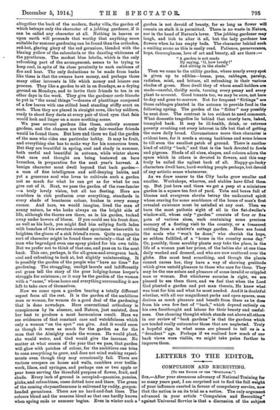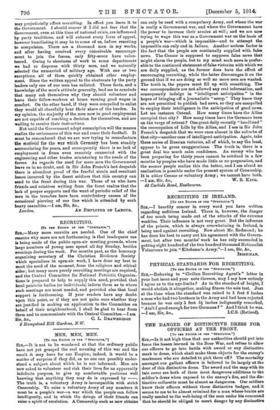LETTERS TO THE EDITOR.
COMPULSION AND RECRUITING. [To nog EDITOR 0T THR "13PECTATOIL."1 Srn,—After your strenuous advocacy of National Training for so many years past, I am surprised not to find the full weight of your influence exerted in favour of compulsory service, now that the nation is on its trial as a nation. The only argument advanced in your article " Compulsion and Recruiting" against Universal Service is that a discussion of the subject may prejudicially affect recruiting. In effect you leave it to the Government. I should concur if I did not fear that the Government, even at this time of national crisis, are influenced by party traditions, and will exhaust every form of appeal, however humiliating it may be to some of us, before resorting to compulsion. There are a thousand men in my works, and after having received every conceivable encourage- ment to join the forces, only fifty-seven have volun- teered. Owing to shortness of work in some departments we had to dispense with thirty men, and we naturally selected the unmarried of military age. With one or two exceptions, all of them quickly obtained other employ- ment. Since the written appeal to the electorate by the party leaders only one of our men has enlisted. These facts, and a knowledge of the men's attitude generally, lead me to conclude that many ask themselves why they should volunteer and leave their fellow-workers at home earning good wages in comfort. On the other hand, if they were compelled to enlist they would all cheerfully bear their share of the burden. In my opinion, the majority of the men now in good employment are not capable of reaching a decision for themselves, and are waiting to receive their instructions.
Not until the Government adopt conscription will the masses realize the seriousness of this war and cease their football. It must be remembered that we are now trying to manufacture the materiel for the war which Germany has been steadily accumulating for years, and consequently there is no lack of employment in Srms even remotely connected with the engineering and other trades ministering to the needs of the forces. As regards the need for more men the Government leave us in no doubt, and in Sir John French's Iast despatch there is abundant proof of the fearful strain and resultant losses incurred by the finest soldiers that this country can send to the front during this war. Those of us who have friends and relatives writing from the front realize that the lack of proper supports and the want of periodic relief of the men in the trenches have been contributory causes of the occasional piercing of our line which is attended by such heavy casualties.—I am, Sir, &o.,



























































 Previous page
Previous page